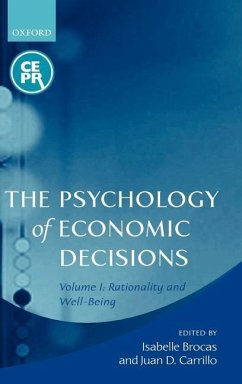Isabelle Brocas / Juan D. Carrillo (eds.)Volume 1: Rationality and Well-Being
The Psychology of Economic Decisions
Volume 1: Rationality and Well-Being
Herausgeber: Brocas, Isabelle; Carrillo, Juan D
Isabelle Brocas / Juan D. Carrillo (eds.)Volume 1: Rationality and Well-Being
The Psychology of Economic Decisions
Volume 1: Rationality and Well-Being
Herausgeber: Brocas, Isabelle; Carrillo, Juan D
- Gebundenes Buch
- Merkliste
- Auf die Merkliste
- Bewerten Bewerten
- Teilen
- Produkt teilen
- Produkterinnerung
- Produkterinnerung
A collection of carefully selected contributions to behavioral economics from some of the leading international scholars in the field. Designed to fully complement Volume One, topics covered include preferences, behavioral game theory, motivated mental states and emotions and decision making.
Andere Kunden interessierten sich auch für
![Smart Choices Smart Choices]() John S. HammondSmart Choices23,99 €
John S. HammondSmart Choices23,99 €![Postmodernism and the Social Sciences Postmodernism and the Social Sciences]() Postmodernism and the Social Sciences106,99 €
Postmodernism and the Social Sciences106,99 €![Property Rights and Managerial Decisions in For-Profit, Non-Profit and Public Organizations Property Rights and Managerial Decisions in For-Profit, Non-Profit and Public Organizations]() K. CarrollProperty Rights and Managerial Decisions in For-Profit, Non-Profit and Public Organizations75,99 €
K. CarrollProperty Rights and Managerial Decisions in For-Profit, Non-Profit and Public Organizations75,99 €![Postmodernism and the Social Sciences Postmodernism and the Social Sciences]() Joe DohertyPostmodernism and the Social Sciences75,99 €
Joe DohertyPostmodernism and the Social Sciences75,99 €![Creative Leadership Creative Leadership]() Gerard J. PuccioCreative Leadership111,99 €
Gerard J. PuccioCreative Leadership111,99 €![The Economics of E-Commerce and Networking Decisions The Economics of E-Commerce and Networking Decisions]() The Economics of E-Commerce and Networking Decisions75,99 €
The Economics of E-Commerce and Networking Decisions75,99 €![Virtue, Vice, and Value Virtue, Vice, and Value]() Thomas HurkaVirtue, Vice, and Value68,99 €
Thomas HurkaVirtue, Vice, and Value68,99 €-
-
-
A collection of carefully selected contributions to behavioral economics from some of the leading international scholars in the field. Designed to fully complement Volume One, topics covered include preferences, behavioral game theory, motivated mental states and emotions and decision making.
Produktdetails
- Produktdetails
- Verlag: Oxford University Press (UK)
- Seitenzahl: 354
- Erscheinungstermin: 10. April 2003
- Englisch
- Abmessung: 246mm x 162mm x 27mm
- Gewicht: 642g
- ISBN-13: 9780199251063
- ISBN-10: 0199251061
- Artikelnr.: 22114135
- Herstellerkennzeichnung
- Libri GmbH
- Europaallee 1
- 36244 Bad Hersfeld
- gpsr@libri.de
- Verlag: Oxford University Press (UK)
- Seitenzahl: 354
- Erscheinungstermin: 10. April 2003
- Englisch
- Abmessung: 246mm x 162mm x 27mm
- Gewicht: 642g
- ISBN-13: 9780199251063
- ISBN-10: 0199251061
- Artikelnr.: 22114135
- Herstellerkennzeichnung
- Libri GmbH
- Europaallee 1
- 36244 Bad Hersfeld
- gpsr@libri.de
Isabelle Brocas is at the Department of Economics, Columbia University. She is also a research affiliate at CEPR, and co-editor of the Annals of Marie Curie Fellows Association. Juan D. Carrillo is Associate Professor at Columbia University Graduate School of Business. He is also a research affiliate at CEPR, and Associate Editor of the Spanish Economic Review.
* Introduction
* Part I: The Causes and Consequences of 'Irrational' Conducts
* 1: Roy F. Baumeister: The Psychology of Irrationality: Why people
make foolish, self-defeating choices
* 2: Kent Berridge: Irrational Pursuit: Hyper-incentives from a
visceral brain
* 3: Jonathan W. Schooler, Daniel Ariely, and George Loewenstein: The
Pursuit and Assessment of Happiness May Be Self-Defeating
* Part II: Imperfect Self-Knowledge and the Role of Information
* 4: Andrew Caplin and John Leahy: Behavioral Policy
* 5: Isabelle Brocas and Juan D. Carrillo: Information and Self-Control
* 6: Ronit Bodner and Drazen Prelec: Self-Signaling and Diagnostic
Utility in Everyday Decision-Making
* Part III: Imperfect Memory and Limited Capacity to Process
Information
* 7: Itzhak Gilboa and Eva Gilboa-Schechtman: Mental Accounting and the
Absentminded Driver
* 8: Roland Benabou and Jean Tirole: Self-Knowledge and
Self-Regulation: An economic approach
* 9: Xavier Gabaix and David Laibson: A New Challenge for Economics:
'The frame problem'
* Part IV: Time and Utility
* 10: Daniel Kahneman: Experienced Utility and Objective Happiness: A
moment-based approach
* 11: Timothy D. Wilson, Daniel Gilbert, and David B. Centerbar: Making
Sense: The causes of emotional evanescence
* 12: Yaacov Trope and Nira Liberman: Temporal Construal Theory of
Time-Dependent Preferences
* Part V: Experimental Practices in Psychology, Economics, and Finance
* 13: Ralph Hertwig and Andreas Ortmann: Economists' and Psychologists'
Experimental Practices: How they differ, why they differ, and how
they could converge
* 14: Denis Hilton: Psychology and the Financial Markets: Applications
to understanding and remedying irrational decision-making
* 15: Ernst Fehr and Jean-Robert Tyran: What Causes Nominal Inertia?
Insights from experimental economics
* Part I: The Causes and Consequences of 'Irrational' Conducts
* 1: Roy F. Baumeister: The Psychology of Irrationality: Why people
make foolish, self-defeating choices
* 2: Kent Berridge: Irrational Pursuit: Hyper-incentives from a
visceral brain
* 3: Jonathan W. Schooler, Daniel Ariely, and George Loewenstein: The
Pursuit and Assessment of Happiness May Be Self-Defeating
* Part II: Imperfect Self-Knowledge and the Role of Information
* 4: Andrew Caplin and John Leahy: Behavioral Policy
* 5: Isabelle Brocas and Juan D. Carrillo: Information and Self-Control
* 6: Ronit Bodner and Drazen Prelec: Self-Signaling and Diagnostic
Utility in Everyday Decision-Making
* Part III: Imperfect Memory and Limited Capacity to Process
Information
* 7: Itzhak Gilboa and Eva Gilboa-Schechtman: Mental Accounting and the
Absentminded Driver
* 8: Roland Benabou and Jean Tirole: Self-Knowledge and
Self-Regulation: An economic approach
* 9: Xavier Gabaix and David Laibson: A New Challenge for Economics:
'The frame problem'
* Part IV: Time and Utility
* 10: Daniel Kahneman: Experienced Utility and Objective Happiness: A
moment-based approach
* 11: Timothy D. Wilson, Daniel Gilbert, and David B. Centerbar: Making
Sense: The causes of emotional evanescence
* 12: Yaacov Trope and Nira Liberman: Temporal Construal Theory of
Time-Dependent Preferences
* Part V: Experimental Practices in Psychology, Economics, and Finance
* 13: Ralph Hertwig and Andreas Ortmann: Economists' and Psychologists'
Experimental Practices: How they differ, why they differ, and how
they could converge
* 14: Denis Hilton: Psychology and the Financial Markets: Applications
to understanding and remedying irrational decision-making
* 15: Ernst Fehr and Jean-Robert Tyran: What Causes Nominal Inertia?
Insights from experimental economics
* Introduction
* Part I: The Causes and Consequences of 'Irrational' Conducts
* 1: Roy F. Baumeister: The Psychology of Irrationality: Why people
make foolish, self-defeating choices
* 2: Kent Berridge: Irrational Pursuit: Hyper-incentives from a
visceral brain
* 3: Jonathan W. Schooler, Daniel Ariely, and George Loewenstein: The
Pursuit and Assessment of Happiness May Be Self-Defeating
* Part II: Imperfect Self-Knowledge and the Role of Information
* 4: Andrew Caplin and John Leahy: Behavioral Policy
* 5: Isabelle Brocas and Juan D. Carrillo: Information and Self-Control
* 6: Ronit Bodner and Drazen Prelec: Self-Signaling and Diagnostic
Utility in Everyday Decision-Making
* Part III: Imperfect Memory and Limited Capacity to Process
Information
* 7: Itzhak Gilboa and Eva Gilboa-Schechtman: Mental Accounting and the
Absentminded Driver
* 8: Roland Benabou and Jean Tirole: Self-Knowledge and
Self-Regulation: An economic approach
* 9: Xavier Gabaix and David Laibson: A New Challenge for Economics:
'The frame problem'
* Part IV: Time and Utility
* 10: Daniel Kahneman: Experienced Utility and Objective Happiness: A
moment-based approach
* 11: Timothy D. Wilson, Daniel Gilbert, and David B. Centerbar: Making
Sense: The causes of emotional evanescence
* 12: Yaacov Trope and Nira Liberman: Temporal Construal Theory of
Time-Dependent Preferences
* Part V: Experimental Practices in Psychology, Economics, and Finance
* 13: Ralph Hertwig and Andreas Ortmann: Economists' and Psychologists'
Experimental Practices: How they differ, why they differ, and how
they could converge
* 14: Denis Hilton: Psychology and the Financial Markets: Applications
to understanding and remedying irrational decision-making
* 15: Ernst Fehr and Jean-Robert Tyran: What Causes Nominal Inertia?
Insights from experimental economics
* Part I: The Causes and Consequences of 'Irrational' Conducts
* 1: Roy F. Baumeister: The Psychology of Irrationality: Why people
make foolish, self-defeating choices
* 2: Kent Berridge: Irrational Pursuit: Hyper-incentives from a
visceral brain
* 3: Jonathan W. Schooler, Daniel Ariely, and George Loewenstein: The
Pursuit and Assessment of Happiness May Be Self-Defeating
* Part II: Imperfect Self-Knowledge and the Role of Information
* 4: Andrew Caplin and John Leahy: Behavioral Policy
* 5: Isabelle Brocas and Juan D. Carrillo: Information and Self-Control
* 6: Ronit Bodner and Drazen Prelec: Self-Signaling and Diagnostic
Utility in Everyday Decision-Making
* Part III: Imperfect Memory and Limited Capacity to Process
Information
* 7: Itzhak Gilboa and Eva Gilboa-Schechtman: Mental Accounting and the
Absentminded Driver
* 8: Roland Benabou and Jean Tirole: Self-Knowledge and
Self-Regulation: An economic approach
* 9: Xavier Gabaix and David Laibson: A New Challenge for Economics:
'The frame problem'
* Part IV: Time and Utility
* 10: Daniel Kahneman: Experienced Utility and Objective Happiness: A
moment-based approach
* 11: Timothy D. Wilson, Daniel Gilbert, and David B. Centerbar: Making
Sense: The causes of emotional evanescence
* 12: Yaacov Trope and Nira Liberman: Temporal Construal Theory of
Time-Dependent Preferences
* Part V: Experimental Practices in Psychology, Economics, and Finance
* 13: Ralph Hertwig and Andreas Ortmann: Economists' and Psychologists'
Experimental Practices: How they differ, why they differ, and how
they could converge
* 14: Denis Hilton: Psychology and the Financial Markets: Applications
to understanding and remedying irrational decision-making
* 15: Ernst Fehr and Jean-Robert Tyran: What Causes Nominal Inertia?
Insights from experimental economics









